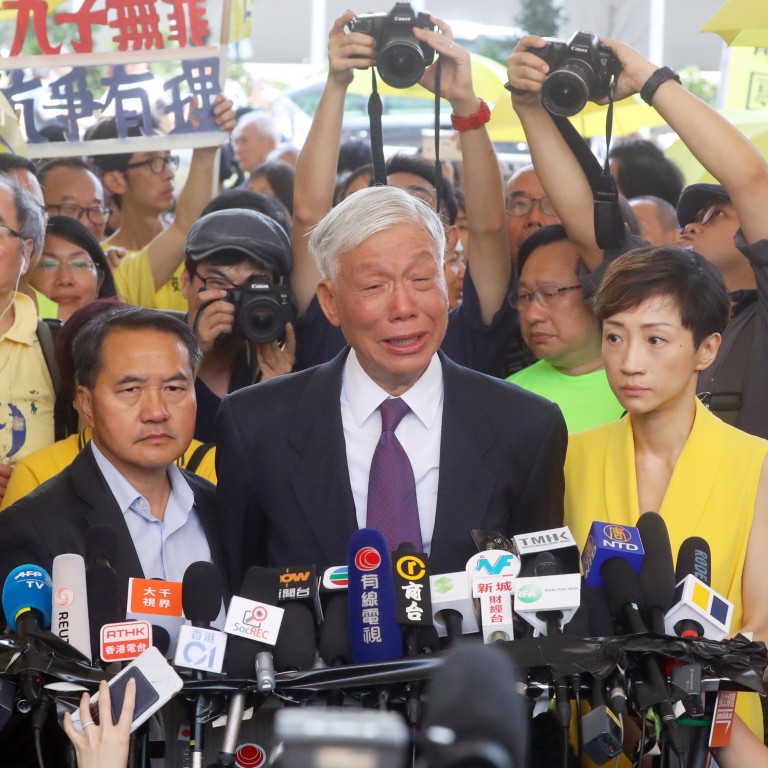
Four of nine Occupy leaders jailed for up to 16 months over roles in Hong Kong’s 2014 umbrella movement
- Sentencing marks the end of years of prosecutions brought against leaders and participants in 79-day protests
- Lawmaker Tanya Chan has sentencing adjourned over life-threatening condition requiring brain surgery
Hong Kong reopened one of the most emotional and divisive chapters in its history on Wednesday as four of nine democracy leaders and key activists convicted on public nuisance charges over the 2014 Occupy protests were jailed for up to 16 months.
Two founders of the city’s biggest civil disobedience movement, academics Benny Tai Yiu-ting, 54, and Dr Chan Kin-man, 60, were given the longest jail terms, at 16 months, while legislator Shiu Ka-chun, 49, and League of Social Democrats vice-chairman Raphael Wong Ho-ming, 30, received eight months each.
Because of poor health and his years of contribution to society, Reverend Chu Yiu-ming, 75, the third founder, had a 16-month sentence suspended for two years.
Lawmaker Tanya Chan, 47, had her sentencing adjourned after her lawyer dropped a bombshell in court, revealing that she was suffering from a life-threatening brain tumour and would have to undergo surgery in two weeks.
Former lawmaker Lee Wing-tat, 63, had his eight-month term suspended for two years in light of his years of public service.
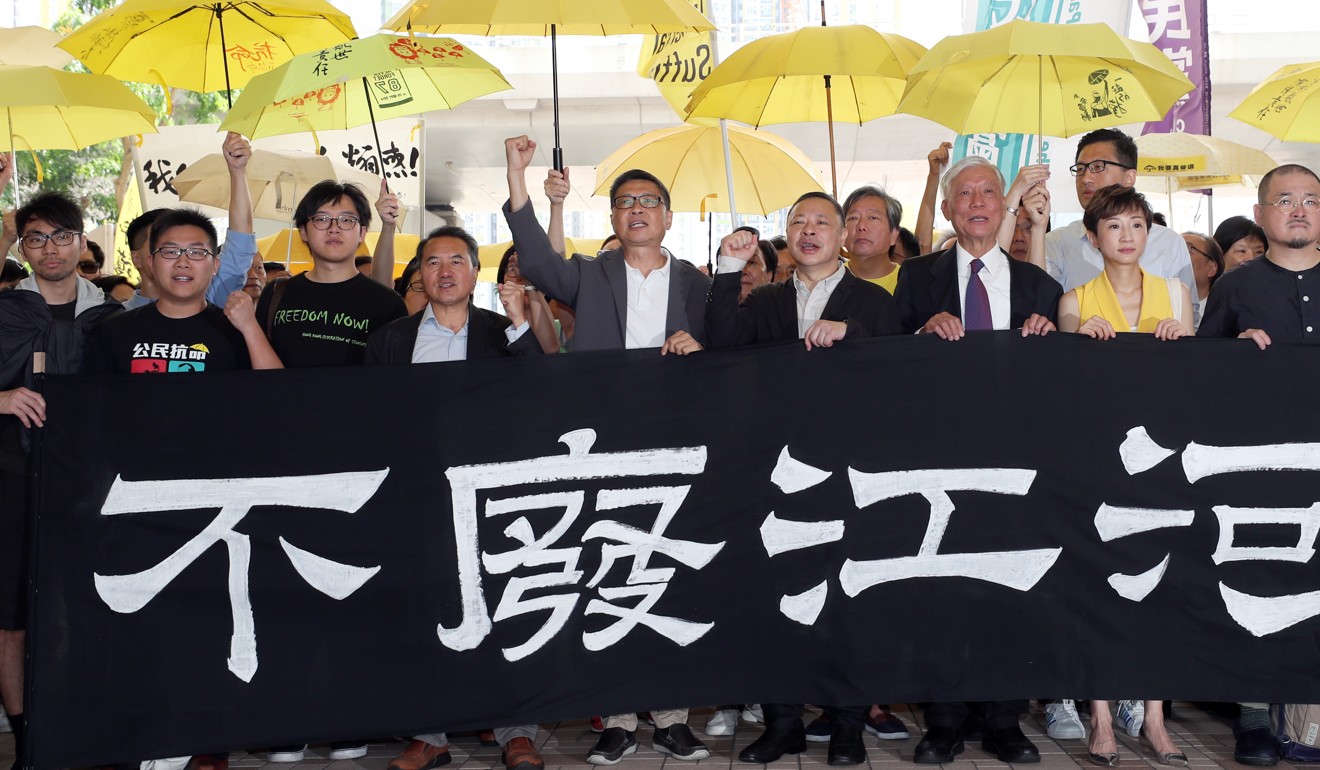
Former student leaders Tommy Cheung Sau-yin, 25, and Eason Chung Yiu-wa, 26, were sentenced to 200 hours of community service and eight months’ jail respectively, but Chung also had his prison term suspended. Their ages were taken into consideration.
All were sentenced by Judge Johnny Chan Jong-herng at West Kowloon Court. The judge criticised the nine for putting their political demands before the lives of others.
All but Cheung and Chung said they planned to appeal against their convictions, and some their sentences.
Occupy leaders found guilty over role in 2014 umbrella movement
The nine were found guilty earlier this month of a string of public nuisance charges – which carry a maximum sentence of seven years’ imprisonment – over the mass protests of 2014 that saw key roads blocked for 79 straight days and the city’s commercial district brought to a standstill in the name of greater democracy for Hong Kong.
While the judge noted the protests had been non-violent, and the goal was not motivated by “greed, lust, anger, or monetary reward”, the obstruction was serious and its duration extensive.
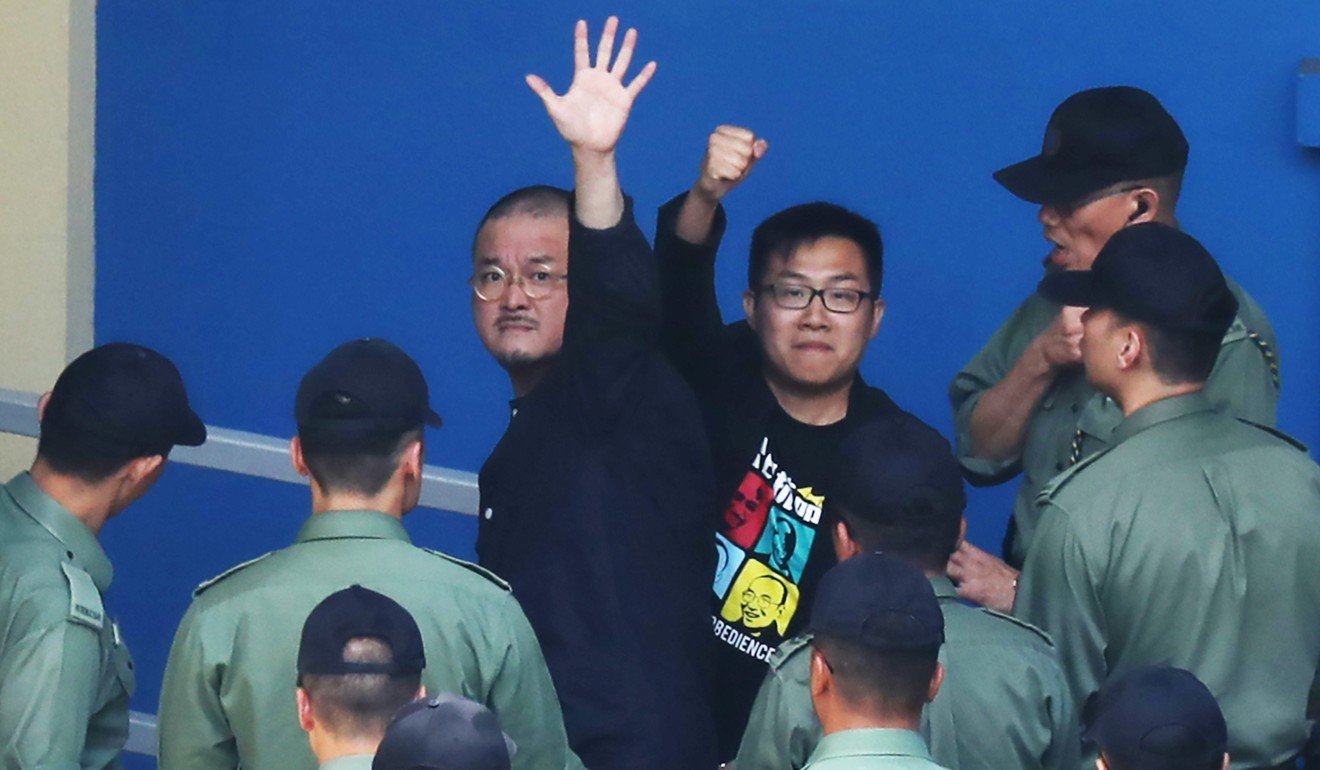
“The nine defendants just looked up to their aspirations ... but they failed to notice the ordinary folks who needed to use the carriageways,” he said, describing their would-be “martyrdom” as “contorted”.
Although Tai had recounted “touching moments” from the protests in court, the other side of the story was that the activists had brought excessive delays and inconvenience to the city, the judge added.
Until now, he noted, the group had not expressed any regret.
“By regret, I do not mean they should give up their political beliefs or demands,” he said. “It is an apology that the members of the public rightly deserve from the defendants, but never received.”
Occupy protests five years on: after all the prosecutions, was the movement in vain?
For the first time, Chu on Wednesday walked out of the dock without his two closest allies, Tai and Chan Kin-man, and burst into tears.
“In the past five years, we have never been apart,” he said, before leaving court. “Today, they were sentenced to jail. I’m in immense sorrow. I am truly willing to go with them.”
Raphael Wong thanked the judge from the dock and vowed to soldier on with his pursuit of democracy as cheers erupted from supporters in the public gallery. Judge Chan returned a smile.
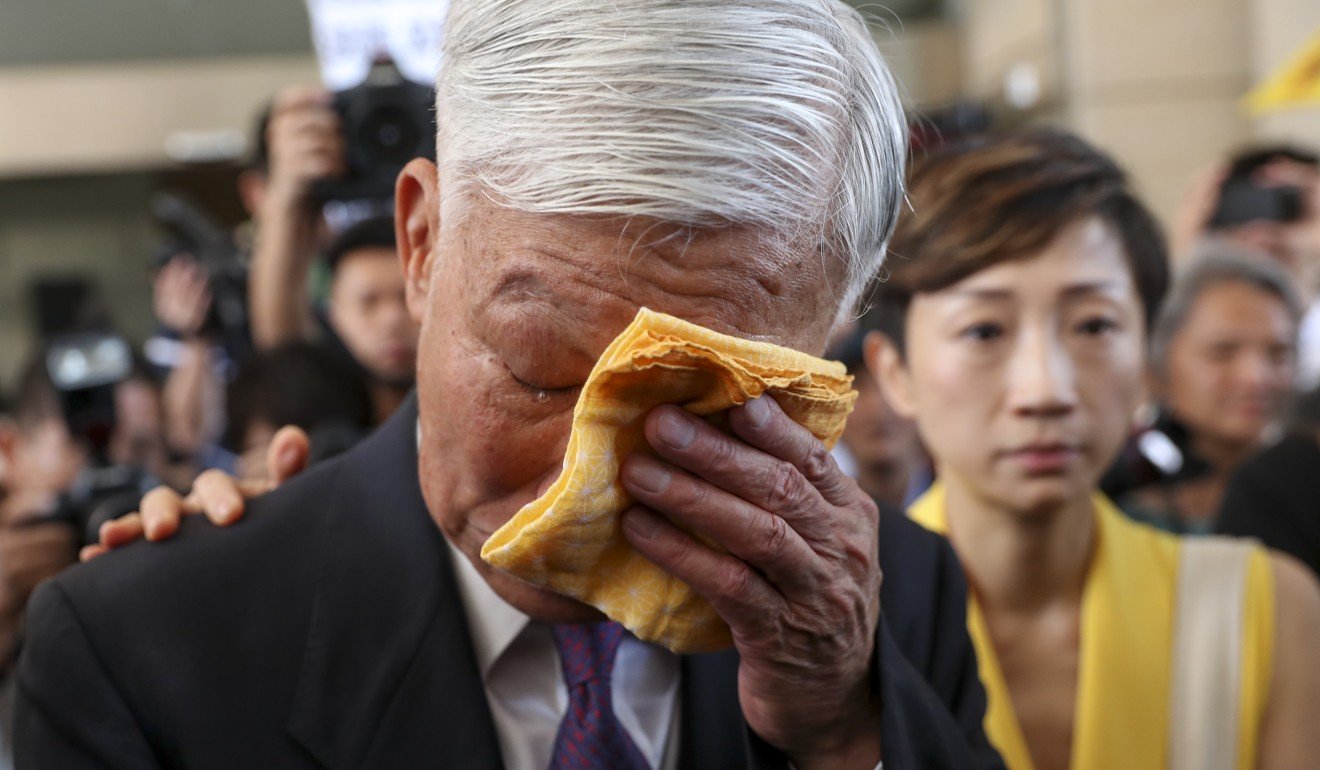
Chan Kin-man, Tai, Wong and Shiu were later taken to Lai Chi Kok Reception Centre.
Their convictions have drawn statements of concern about the impact on the city’s freedoms from Western diplomatic missions, as well as human rights groups.
Hong Kong’s leader, Carrie Lam Cheng Yuet-ngor, declined to comment on the sentencing but insisted the prosecution of the activists had not undermined freedom of expression or the right to demonstrate.
“I don’t see any of these effects, or any of these activities being affected,” Lam said.
Tears in court as first Occupy leaders deliver mitigation submissions
The protests, which began on September 28, 2014, were sparked by frustration over a restrictive framework Beijing had laid down for the direct election of Hong Kong’s leader.
Democracy activists had been expecting to elect a chief executive through a one-person, one-vote system, but were outraged that they would have to settle for a pool of preselected candidates.
A little more than a month after Beijing’s ruling, protesters poured into Admiralty, Wan Chai and Central, blocking major thoroughfares in the heart of the city. Police fired tear gas but failed to disperse them.
The nine were found guilty of a range of public nuisance charges on April 9 following an 18-day trial that revisited the civil disobedience movement through testimony from police officers, footage of the protests and the words of those who took part.
Judge Chan called the protest plan unrealistic, saying it was naive to think “a concession to introduce the form of universal suffrage advocated by the founding trio could be made by the government overnight with a click of its fingers”.
During mitigation, Chan Kin-man, Tai and Wong urged the judge not to jail Reverend Chu, citing worries for his health.
Who are the nine key leaders of Hong Kong’s Occupy movement?
On Wednesday, Judge Chan accepted that request, saying he was “impressed and touched” by Chu’s 30-plus years of service helping drug addicts and HIV patients.
“I am also concerned about his age,” he said.
The judge also acknowledged former lawmaker Lee’s track record of serving Hong Kong, saying it was time for the court to recognise those contributions.
Ex-student leaders Cheung and Chung were still young and lacked life experience, Chan said as he spared them jail.
As for the rest, the judge said, they could only be punished with immediate custodial sentences but he shortened them by a month to two months after considering their good characters, with the exception of Wong’s sentence.
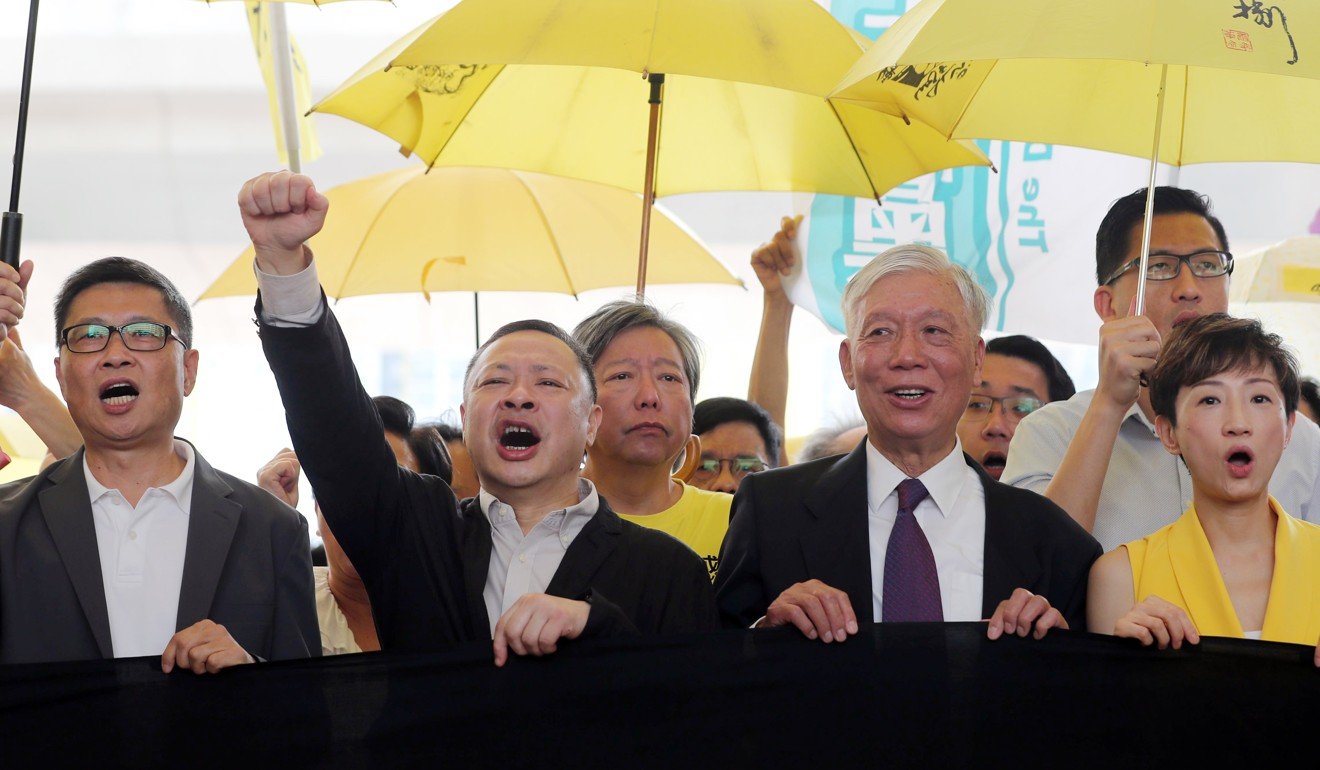
Tai, Chan Kin-man and Chu were found guilty of one count of conspiracy to cause a public nuisance. Tai and Chan were also convicted of one count of inciting others to commit the same offence. The three were acquitted of one count of inciting others to incite, and Chu was also cleared of one count of incitement.
Tanya Chan, Shiu, Cheung, Chung and Wong were all found guilty of one count each of inciting others to incite and one count each of inciting. Lee was found guilty of one incitement charge.
What is more naive than believing in ‘one country, two systems’?
Wednesday’s sentencing session began as more than 100 people with yellow umbrellas – the symbol of the movement – awaited the arrival of the nine on the ground floor of the court building. Some wore yellow shirts with the words “I was not incited”, in defiance of court findings that the group had incited others to block roads in 2014.
Before walking into court, Chan Kin-man said the group would only discuss appeals after the sentencing.
“In the verdict, the judge commented that we were naive – believing that by having an Occupy movement, we could attain democracy,” Chan said.
“But what is more naive than believing in ‘one country, two systems’?”
He was referring to the policy under which Hong Kong has been granted a high degree of autonomy by Beijing since 1997.
Tai said he felt “peaceful and hopeful” before learning of his fate. Chu urged democracy activists in Hong Kong not to give up even if the nine were all jailed.
The group walked into court surrounded by supporters chanting: “We want genuine universal suffrage.”
Tai and Shiu said prayers and sang hymns with a small group, before joining other Occupy leaders to address journalists.
They received rounds of thunderous applause when they eventually turned up on the fourth floor outside the courtroom for the sentencing.
Security measures were stepped up as scores of pro-Beijing protesters also gathered outside the court building, chanting through loudspeakers: “You have to pay for occupying Central.”


